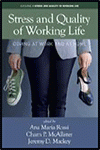
Stress and Quality of Working Life
Coping at Work and at Home
Edited by:
Ana Maria Rossi, International Stress Management Association
Charn P. McAllister, Northern Arizona University
Jeremy D. Mackey, Auburn University
A volume in the series: Stress and Quality of Working Life. Editor(s): Ana Maria Rossi, International Stress Management Association. Charn P. McAllister, Northern Arizona University. Jeremy D. Mackey, Auburn University.
Published 2024
This is the eighth edition of the Stress and Quality of Working Life book series. The Brazilian section of the International Stress Management Association (ISMA-BR), a not-for-profit organization that studies stress and ways to prevent it, together with two renowned American researchers, has organized the eighth volume of the series Stress and Quality of Working Life: Coping at Work and at Home. The new volume offers some of the latest theories and methods on how to cope with stress and quality of working life issues based on the experience and knowledge of recognized international experts in this field. This book is meant to be a tool to provide information and suggest ways to deal with pressures and demands from the workplace.
The contemporary workplace includes a combination of traditional workplace environments, work-from-home arrangements, and hybrid models with some combination of working from a traditional environment and at home. Our authorship team comprises international experts from many disciplines so we can provide insights into contemporary stress and quality of working life issues, as well as how to cope with them at work and at home.
CONTENTS
Preface, Ana Maria Rossi. Foreword, Ana Maria Rossi, Charn P. McAllister, and Jeremy D. Mackey. SECTION I: SOURCES OF STRESS AT HOME. From the Office to Home: The Impact of Remote Work During the COVID-19 Pandemic on Work–Family Conflict, Luis Felipe Dias Lopes, Martiele Gonçalves Moreira, Deoclécio Junior Cardoso da Silva, Joana Conduto Vieira dos Santos, Mauren Pimentel Lima, Maria Emilia Camargo, and Vania Medianeira Flores Costa. It Doesn’t Stay at Home: Spillover of Abusive Relationships to the Workplace, Kaylee J. Hackney. Autism and Neurodiversity: Identity and Loneliness, Marcos Weiss Bliacheris. SECTION II: THE IMPACT OF NEGATIVE LEADERSHIP AT WORK. A Meta-Analytic Examination of the Impact of Destructive Leadership and Employee Personality on Employee Subjective Well-Being, Joshua C. Palmer, Katherine C. Alexander, B. Parker Ellen III, and Pamela L. Perrewé. Unhelpful Help: Introducing an Under-Examined Interpersonal Stressor in the World of Work, Cheryl E. Gray, Wassim Elhouar, and Ian M. Hughes. Exploring Supervisor-Induced Stressors, Employee Job Neglect, and Counterproductive Workplace Behaviors: The Potential Benefits of the Machiavellian Employee, Maria V. Bracamonte, Benjamin D. McLarty, and Matthew J. Quade. SECTION III: ATTEMPTS TO PROMOTE GREATER QUALITY OF WORKING LIFE. Quality of Working Life in Public Security Organizations, Cleandra Danyelle Cavalcanti Mendes Melo, Darlin Saratt Mezomo, and Marcos Aguiar de Sousa. Quality of Working Life and Environment, Social, and Governance (ESG) Indicators: A Systemic View for Well-Being, Maria Aparecida da Cruz Constantino and Liana Caron Nazareth Peçanha. Studies and Interventions on Quality of Life and Occupational Stress in Brazil, Paulo Lourenco Domingues Junior and Anderson de Souza Sant’Anna. SECTION IV: COPING. Psychological Safety as a Protective Factor for Workers’ Mental Health: A Systematic Review, Carla Furtado. Providing Support to Employees in a Strategically Relevant Manner: Can Leader–Follower Relationships Compensate for Low Organizational Support? Brian Gregory. If I Don’t Laugh, I’ll Cry: Using Humor to Cope With Work-Related Stressors, Jacob A. Waddingham and Lisa L. Brady. About the Editors. About the Contributors.
-
Paperback979-8-88730-462-5
Web price: $45.04 (Reg. 52.99)
-
Hardcover979-8-88730-463-2
Web price: $80.74 (Reg. 94.99)
- eBook979-8-88730-464-9

- HEA000000 - HEALTH & FITNESS: General
- BUS097000 - BUSINESS & ECONOMICS: Workplace Culture
- SEL024000 - SELF HELP: Stress Management
-
 Coping and Prevention
Coping and Prevention
-
 Improving Employee Health and Well Being
Improving Employee Health and Well Being
-
 Stress and Quality of Working Life
Conceptualizing and Assessing Stress
Stress and Quality of Working Life
Conceptualizing and Assessing Stress
-
 Stress and Quality of Working Life
Finding Meaning in Grief and Suffering
Stress and Quality of Working Life
Finding Meaning in Grief and Suffering
-
 Stress and Quality of Working Life
Current Perspectives in Occupational Health
Stress and Quality of Working Life
Current Perspectives in Occupational Health
-
 Stress and Quality of Working Life
The Positive and The Negative
Stress and Quality of Working Life
The Positive and The Negative
-
 Stress and Quality of Working Life
Interpersonal and Occupation‐Based Stress
Stress and Quality of Working Life
Interpersonal and Occupation‐Based Stress

